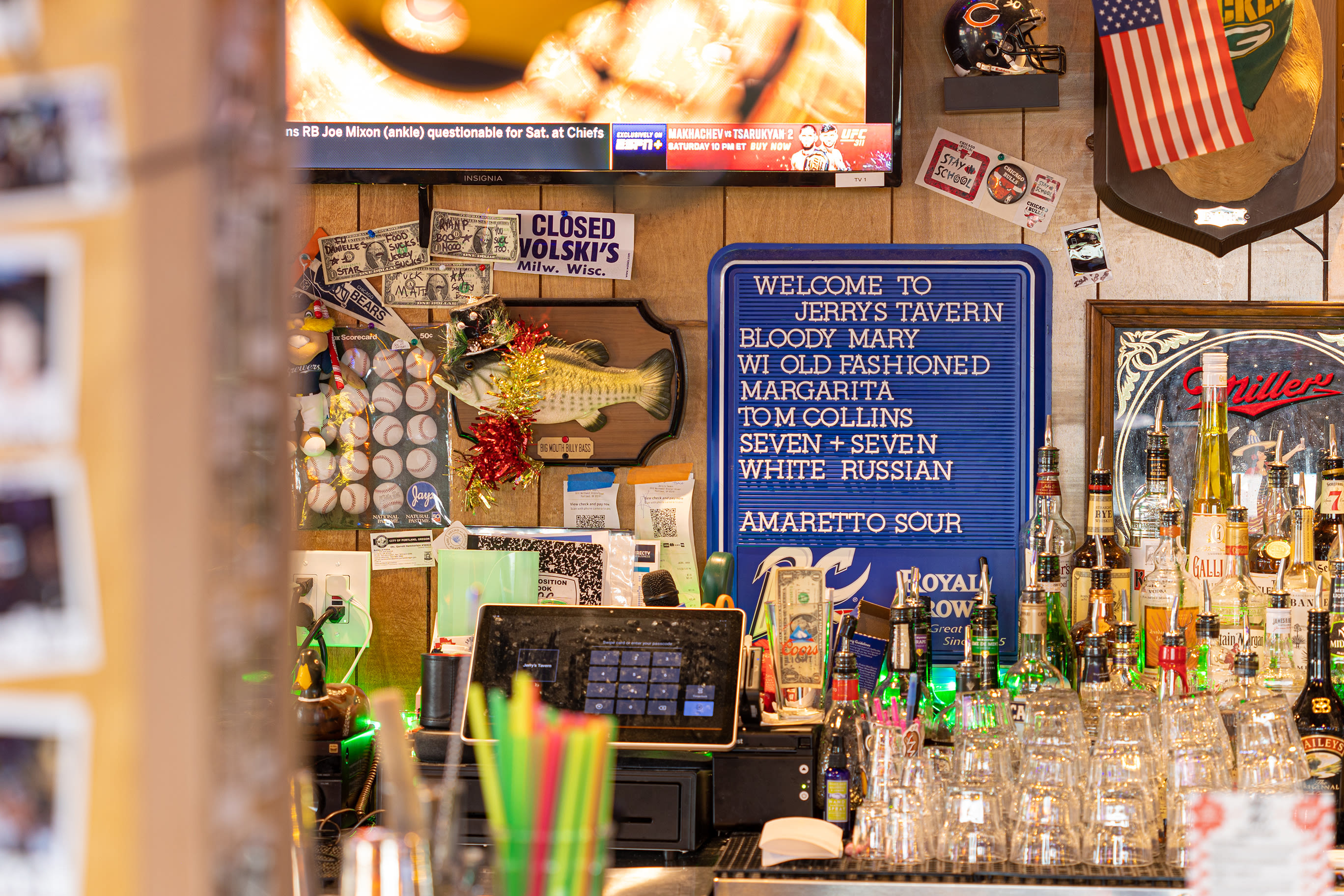Portland's Best Places to Work
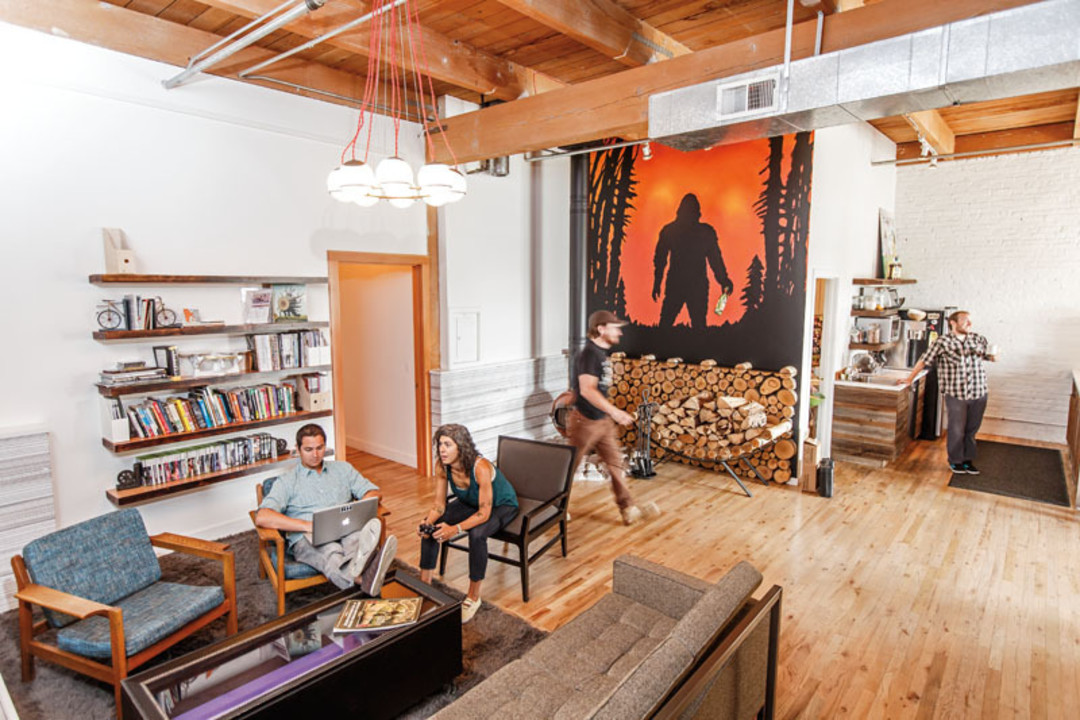
CULTURE (n) The shared attitudes, values, goals, and practices that characterize an institution, organization, or group of people
ROUNDHOUSE
- 82 Employees
- 1,000-fold increase in revenue since 2001
- 2 beers on tap
IN 2001, Joe Sundby and Dana Bainbridge accidentally started a marketing agency. Basically, they liked messing around on computers, taking pictures, and “designing stuff” (as Sundby puts it) for snowboarding companies, while working out of their basements. In the first year, they billed a grand total of $20,000.
Today, Roundhouse sprawls over two floors of Southeast Portland’s East Bank Lofts. (Sundby remembers attending debauched after-hours parties in the 1912 industrial structure back in his ’90s rocker days; more Portlanders would recognize the premises by the ground-floor J&M Café.) More than 80 employees work for clients like Adidas, Red Bull, and XBox. Projected 2013 gross: $20 million.
Despite exponential growth, Sundby keeps the culture grounded in the improvisational chaos of the firm’s beginnings. (Bainbridge prefers to work remotely, from a cabin he designed for himself in the woods outside of Weed, California.) Fridays often see all-staff socials, with prizes (bonus vacation time, swag from clients) and beer from Widmer Brothers (a client) on tap. The staff has grown so large Sundby can’t socialize with everyone anymore, so managers are effectively under orders to take their teams out on the town.
“For me, getting paid to do this stuff is a dream,” the cofounder says. “I grew up doing hard manual labor to make tiny amounts of money. I don’t want to lose sight of that. We want this to be a sanctuary for everyone, where they can be their most creative.”
And it does feel good at Roundhouse. The light is natural. Sheets of recycled sailcloth serve as the only dividers between most workspaces. Kitschy-cool Northwest décor abounds, the functional ’70s ski-lodge fireplace being particularly impressive.
But trappings aside, Roundhouse aspires to a deeper ideal, one shared by many of Portland’s most fascinating and (yes) successful businesses: reinventing work. As companies bank on the selling of ideas, human-resource hierarchies have dissolved in favor of looser, more collaborative creative flows. In competitive fields like high-tech and marketing, employers wage a cool-place-to-work arms race to lure talent. On the flip side, with metro-area unemployment still around 7.5 percent, those lucky enough to draw paychecks don’t get the luxury of slacking off. If you’re laboring longer and harder than ever, work should be better than tolerable—and some Portland companies (with plenty of help from their workers) make it downright pleasant.
If Roundhouse provides a glimpse of the horizon, the future could be bright—from both employers’ and employees’ perspectives. The firm’s workforce has nearly doubled since 2011, and it’s quietly become a coveted gig in its field. “When I interviewed here, I told myself, ‘If I don’t get this job, I’m moving to Siberia and shaving my head,’” says Jake Watt, a strategist who moved to Portland from Miami. When he arrived, he found a freewheeling atmosphere, where senior partners brainstorm on equal terms with junior copywriters and entry-level designers.
“It’s wide open,” he says. “Everyone knows they can throw their best ideas in, and no idea gets cut until a better one comes along. Even if it’s not your idea that wins, you’re still excited.”
As long as all that remains true, Sundby believes Roundhouse can grow without losing touch with its humble past. “The most junior person could walk through my door with the best idea, so I leave the door open,” he says. “When we started, we had no idea how an agency should look or operate. We still don’t know, so we just do it our way.”
Get a Closer Look at Roundhouse
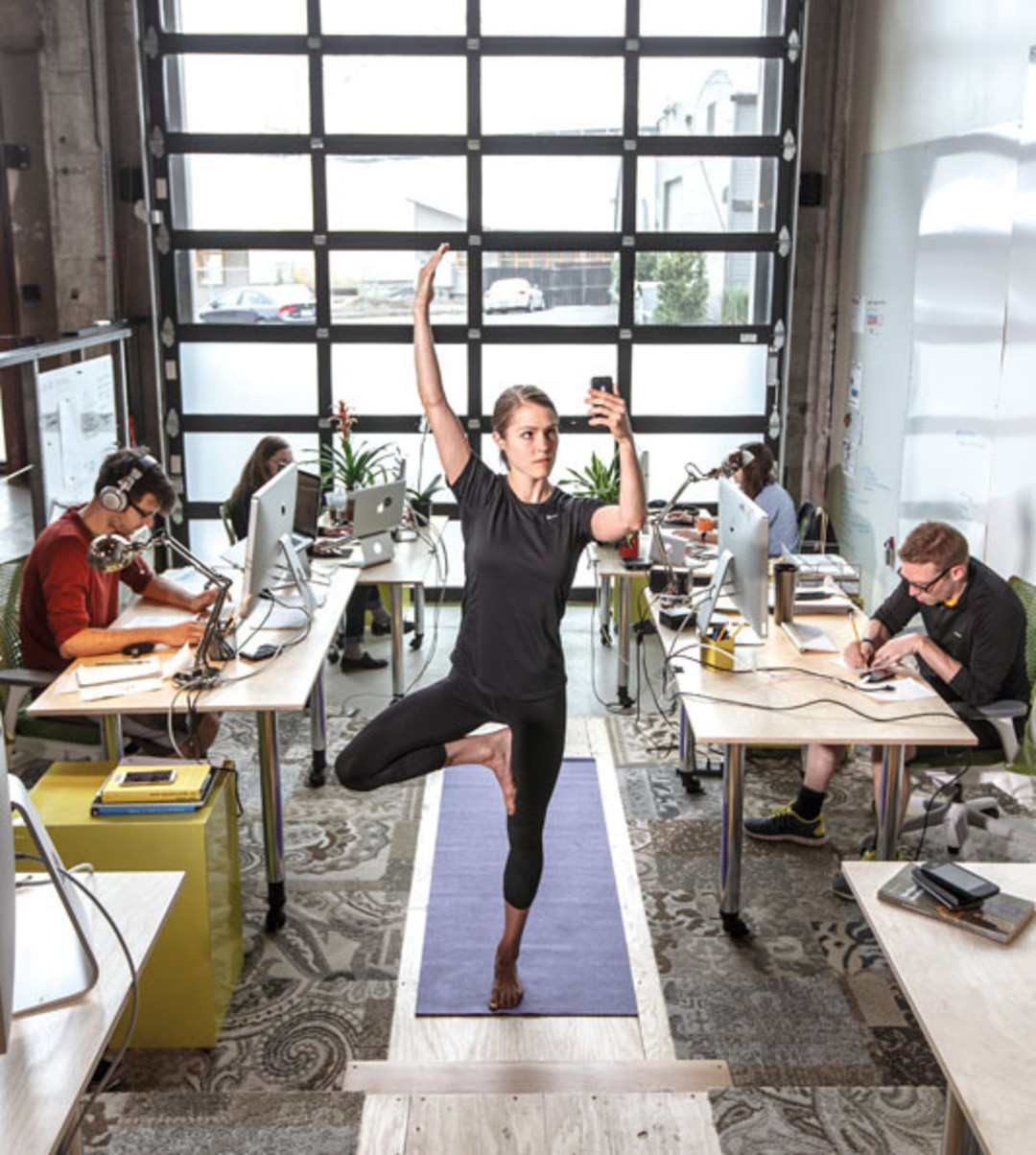
Image: Stuart Mullenberg
WELLNESS (n) A state of good health, encompassing mental, physical, and emotional well-being
CITIZEN
- 32 Portland employees
- 8-figure revenue
- 1 communal tandem bike
It’s almost 2014. If you haven’t been regaled on the glories of sitting on a yoga ball or switching to a standing desk, consider your workplace behind the times. “Wellness”—the revolutionary notion that healthy employees make better workers—has become office culture conventional wisdom. Everyone’s walking at lunch. Everyone wants an office shower so they can run in the afternoon.
But Citizen, a low-profile Northwest Portland firm that creates mobile software and strategy for enormous global brands, is determined to stretch the trend to radical new lengths.
“The world is saturated with products that measure fitness and exercise activity,” says Quinn Simpson, the company’s user-experience director. “We want to talk about why.”
Last year, a group of Citizen workers—guinea pigs, or pioneers—volunteered to let the company track their exercise habits. (Thanks to wearable products like Nike’s FuelBand and Fitbit, the tech-savvy can now easily compile and upload daily run distances and calorie burns.) The company wants that information so it can measure, with increasing precision over time, just how fitness affects job performance.
“It’s more than just data,” says Drew Klonsky, who has steered the company he started in his basement in 2005 to contracts with Adidas, Intel, AT&T, and ABC/Disney. “It’s seeing how your fitness affects the organization.” Klonsky, a 47-year-old whose own triathlon training helped inspire the project, hopes transparency could create positive peer pressure. “We hire people in their 20s, but the irony is, they’re not always the most fit,” he says. “Maybe they’ll feel the kinship of their peers, spiritually and culturally.”
Eventually, the company hopes to track every factor that affects productivity, and use that knowledge to shape the perfect office environment. “If one team is doing well, maybe they’re getting a lot of sleep,” says partner Scé Pike. “Or maybe they’ve got their lighting set perfectly.” That vision echoes the “scientific managers” of 100 years ago who used film to make assembly lines more efficient. In the near term, Citizen’s fitness push is having tangible results.
“My hamstrings are killing me,” Klonsky says.
See Citizen’s fitness plan in action
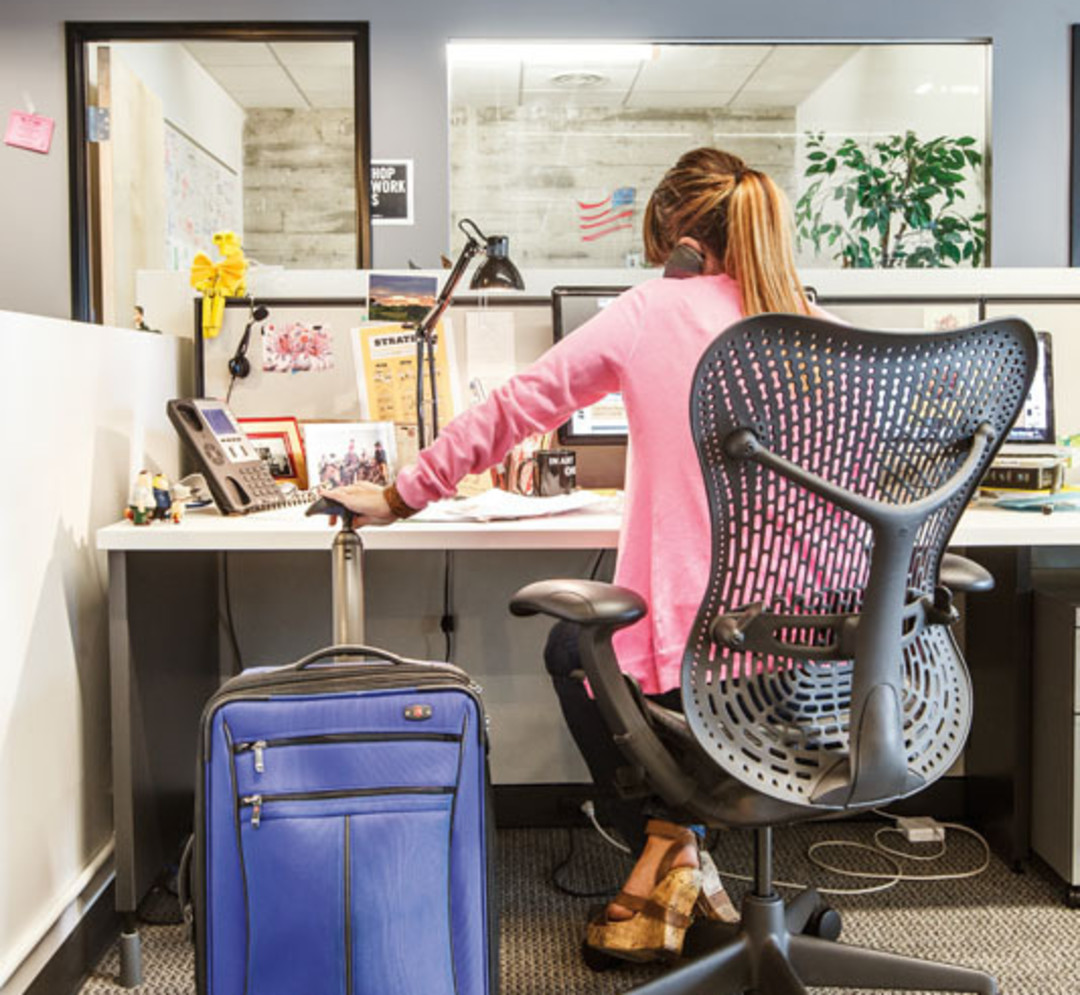
Image: Stuart Mullenberg
GLOBAL OPPORTUNITY (n) The prospect of advancement, achievement, or success, anywhere in the world
XPLANE
- 34 employees
- Offices in Portland and Amsterdam
- 99 percent of revenue from outside oregon
The design and business consulting firm Xplane makes its home in downtown Portland, but a fifth of its revenue comes from outside the US. (Clients have included Procter & Gamble, Raytheon, Britain’s Royal Mail, and BASF.) That means every new hire is seen as a passport to the company’s future and its internationalist outlook.
“The creative employee of the future has to be a globalist,” says Xplane CEO Aric Wood. Wood’s not alone in that view: British writer and business school professor Lynda Gratton argues that smallish companies like Xplane that work internationally reflect a transformation as profound as the Industrial Revolution. “Organizations are operating in a global context even if they don’t have a presence overseas,” Gratton recently told the New York Times. “This is true for individuals, too.”
Xplane does run a branch office in Amsterdam—the direct flight from PDX comes in handy—but stands apart in how it hardwires globalism into its work. “Our whole company is built around agility,” Wood says. Portland-based employees can apply for two-year stints in Amsterdam, after which they rotate home.
“My job is about helping people understand ideas,” says associate creative director Tim May, who recently returned home to Portland from four days in Senegal and spent six months of 2010 in Amsterdam helping open that office. That understanding, he contends, is particularly important when “rhythm and culture” are different.
“In Senegal, you keep your mobile phone well charged, because the power goes out,” he notes. “In the Netherlands, there’s a whole culture around informal, handshake business deals. You learn to navigate.”
As CEO, Wood also sees employees’ broader horizons as a business asset.
“If you’ve been doing something—anything—for a while, you develop retrograde amnesia and forget what made you great at it in the first place,” he says. “Working abroad is a great way to stay sharp.” As for the complexity of running a company on two continents: “The best way to build shared culture is to buy plane tickets.”
WORKSPACE (n) A room, set of rooms, or building where the business of a commercial or industrial organization is conducted
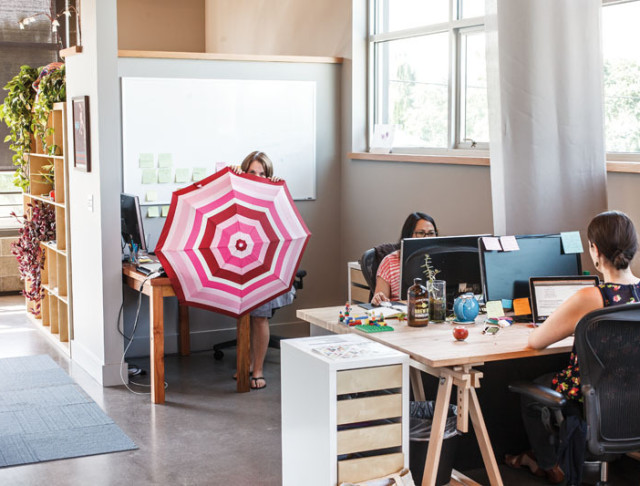
Image: Stuart Mullenberg
INTROVERTS AND THE “OPEN OFFICE”
“Social innovation” firm Context Partners designed new offices on NE Alberta Street with two personality types in mind: introverts and extroverts. “We collaborate a lot, and we’re often on the phone,” says Jensie Miksich, who led the project. “You’re always so aware of what everyone is doing.” The result blends hierarchy-blurring openness—no private offices—and “rest and recovery” spaces for the retiring types.
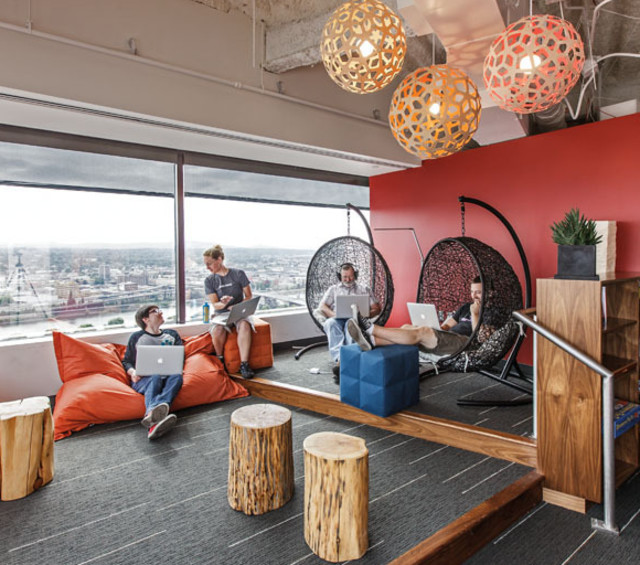
Image: Stuart Mullenberg
THE CORNER OFFICE IS DEAD
Over four years, software analytics company New Relic’s Portland office rocketed from three people to more than 80 employees and a $10 million payroll. Challenge: preserving the grassroots energy its engineers loved. Solution: transforming an old-style US Bancorp Tower corporate space into a candy-colored funland, with meeting-room names from comic books (“Spider Skull Island”) and open collaborative spaces instead of corner offices. “Space is an investment that pays off in terms of who we can hire and how we all feel at work,” says senior VP Jim Gochee. “We’re out of the adolescent phase, but don’t want to lose our culture.”
Explore New Relic’s candy-colored funland of an office
COOL SPACE CAN LURE TOP TALENT
Christopher Espinoza, founder of barbershop mini-chain The Modern Man, on design as a competitive edge
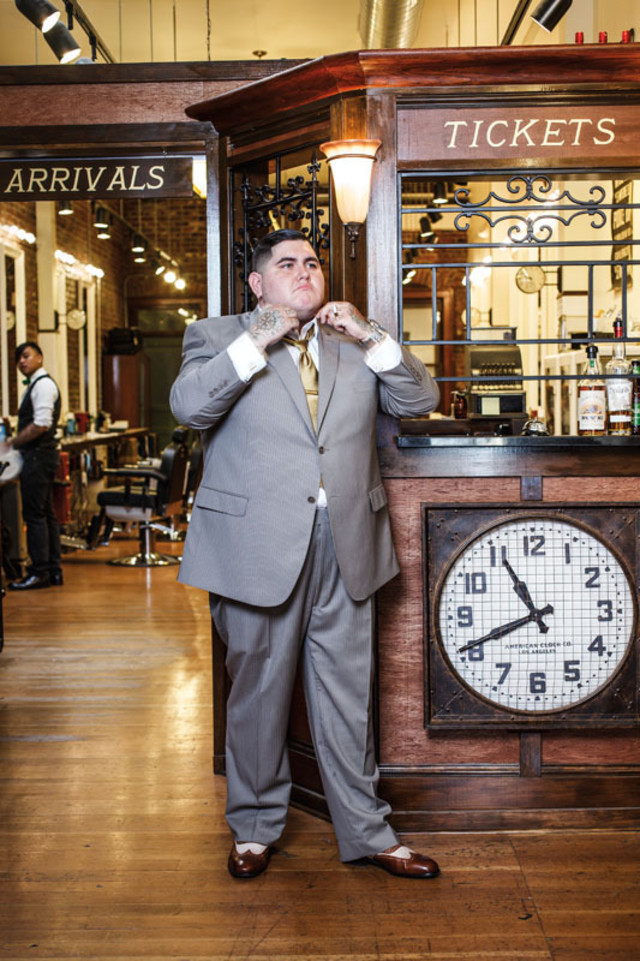
Image: Stuart Mullenberg
You stuffed your first shop on Alberta with animal heads and retro knickknacks. Were you riding Portland’s old-time trend?
There wasn’t much of a plan. When we added the bar upstairs, I tried to create an environment where my dad would want to go—he’s an old Mexican cowboy.
How did design become so important to your brand, then? People started to say, “Oh, we love the concept.” So the second shop, on Hawthorne, became a library, the refined side of the Modern Man. Our third shop, on N Mississippi, is a long narrow room, which suggested the history of that street as a streetcar line. So: train station.
Does this stuff matter to workers?
Who wants to leave their job? And yet we’ve been able to attract both veteran Portland barbers and really interesting new talent. Barbers often work in environments where the owner thinks a Playboy and big TV is all you need. But barbering is an art form, and like any art form, ego is a part of it. Our guys get to work in spaces they know were loved.
Three Portland spaces that redefine the conference room
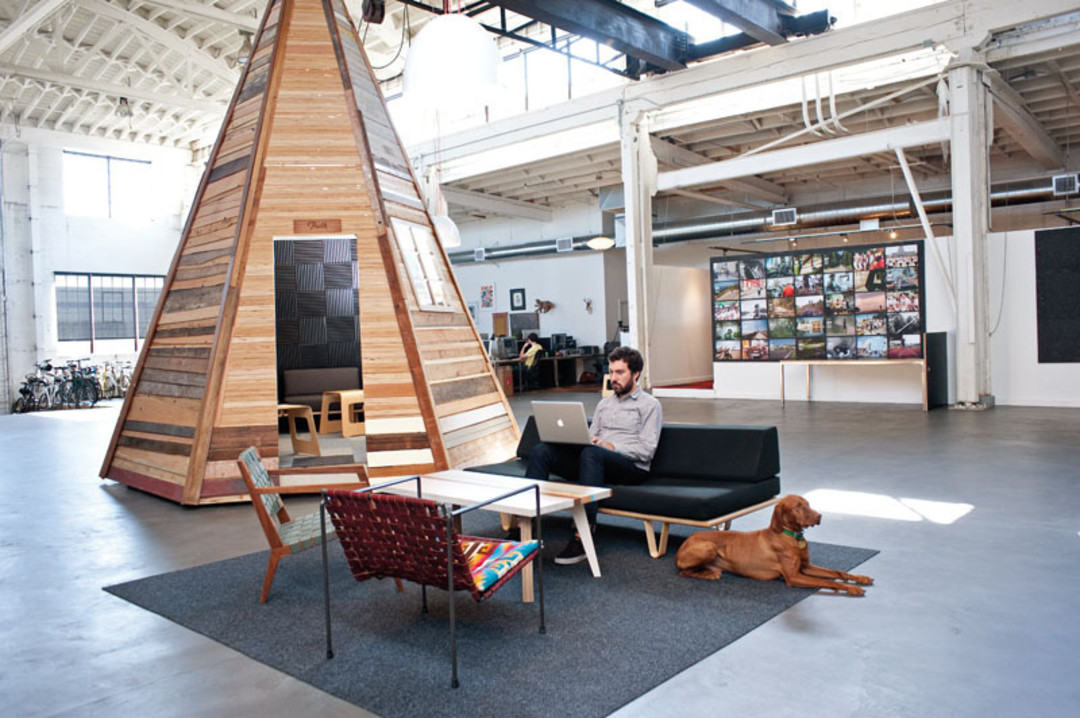
Image: Stuart Mullenberg
Instrument: The Teepee
A fire at old digs forced this marketing and design firm into an “all hands on deck” overnight renovation of an empty industrial NE warehouse. Short on enclosed meeting spaces (or walls), they struck on a novel solution: a teepee (above). More than just a clever piece of construction, it came to represent a new, more communal workplace culture.
Industry: The Container
When digital experience and product design company Industry needs to tackle an extra-crunchy problem, team members retreat to the shipping container: a made-to-order, matte-black steel box, just big enough for a six-person table. At the head of the table sits an elk skull, to represent the problem-solving idea they hope to hit on: “We call it king of the hill,” says founding partner Oved Valadez. “This is where we brainstorm, sketch, collaborate.”
Wieden+Kennedy: The Nest (a.k.a. “Out in the Sticks”)
The architectural statement—a bare platform cantilevering over the ad agency’s exposed sixth-floor beams—looked cool, but often sat empty. Enter installation artist and sculptor Patrick Dougherty, who wove countless locally sourced sticks and branches into a semisecluded, downright cozy place.
Three Euro-Cool Offices We Covet
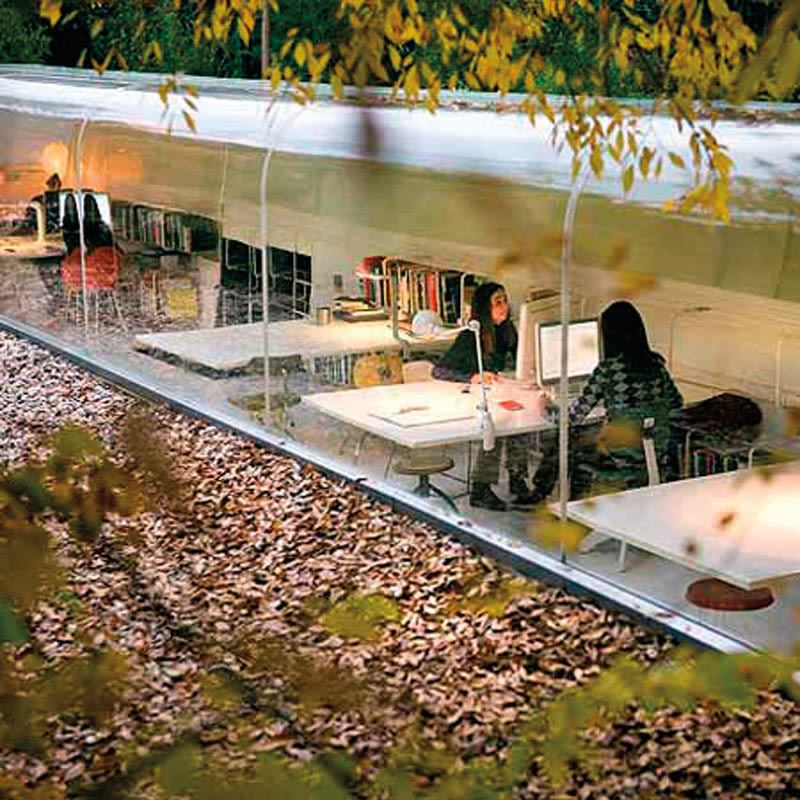
Selgas cano Architects in Madrid
A transparent tube running through a forest
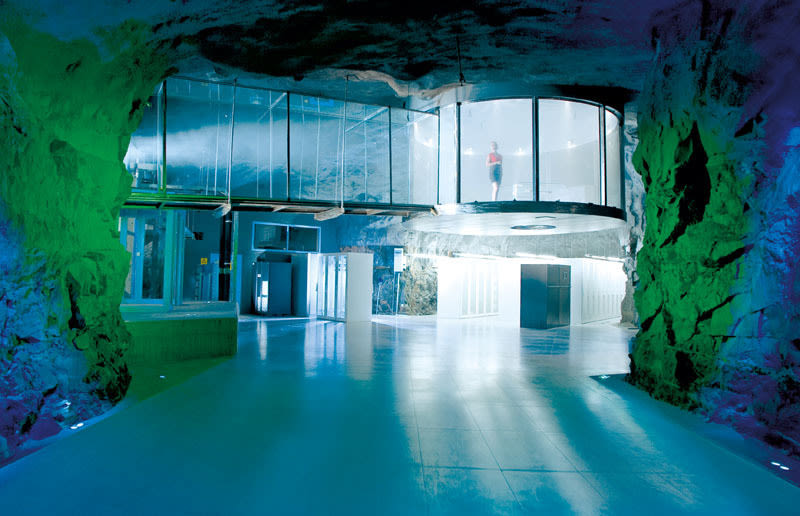
Internet provider Bahnhof in Sweden
A scary-cool underground lair (in a former bomb shelter)
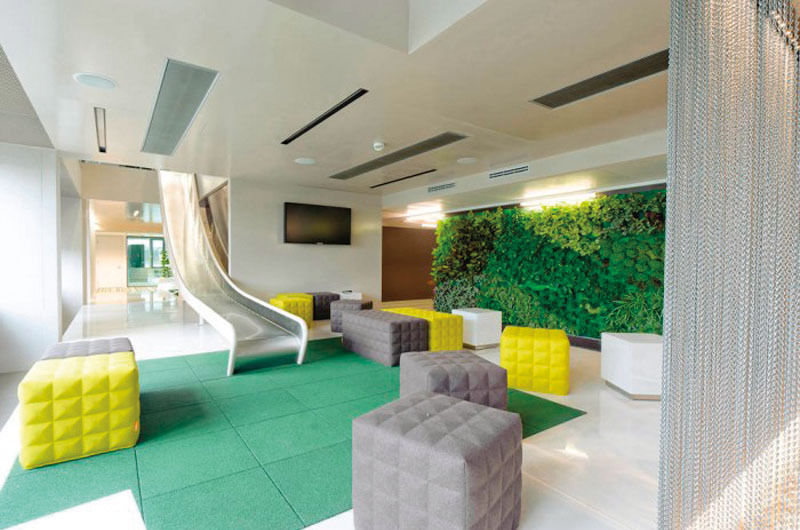
Microsoft’s headquarters in Vienna
It has a slide. A slide!
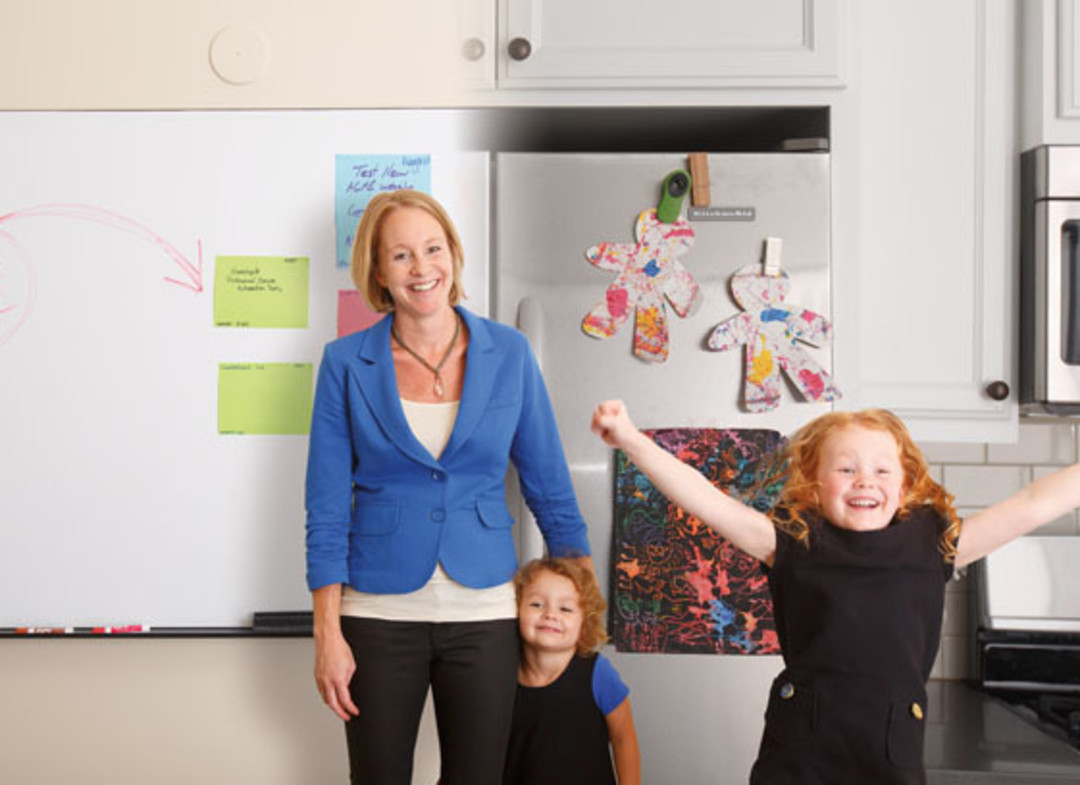
Image: Stuart Mullenberg
FLEXIBILITY (n) Susceptibility to modification and adaptation
ACME
- 73 Employees
- Rotating dinner parties hosted by bosses
As consultants—those most mysterious creatures of the work world—the people at Acme help businesses solve problems. When a client can’t untangle an organizational knot or figure out a new process, Acme’s experts step in.
Appropriately enough, Acme itself began as a solution to a problem: the consulting industry’s brutal culture of constant travel. “We all worked for big, traditional consultancies,” says Peter Lizotte, one of three founders. “You’re never home.” (Think of George Clooney, drifting through Up in the Air.)
So in 2002, Acme flipped the model: it takes on only local clients. (Branch offices in Seattle and San Diego lend range.) For veteran consultants like Kari Nordquist—who spent seven years at mammoth international firm Accenture flying out on Mondays and home on Fridays—“home” could evolve beyond just another destination. “I got to have a life,” the mother of two (above) says. “I got to actually know the city I live in, and get involved in the community.”
Nordquist also discovered that Acme’s local-only focus translates into a broader commitment to flexibility. As family demands have shifted, she rearranged her schedule in various part-time configurations, rare in an industry built around satisfying clients, no matter what. Acme also lets employees manage their own vacation time. “If people are hitting their marks,” Lizotte says, “I don’t care if they take time off. I’m more concerned about them not taking time off.”
The limber approach, Lizotte says, is nothing less than his people deserve. “We really only hire the best,” he says, “so we try to keep them happy.”
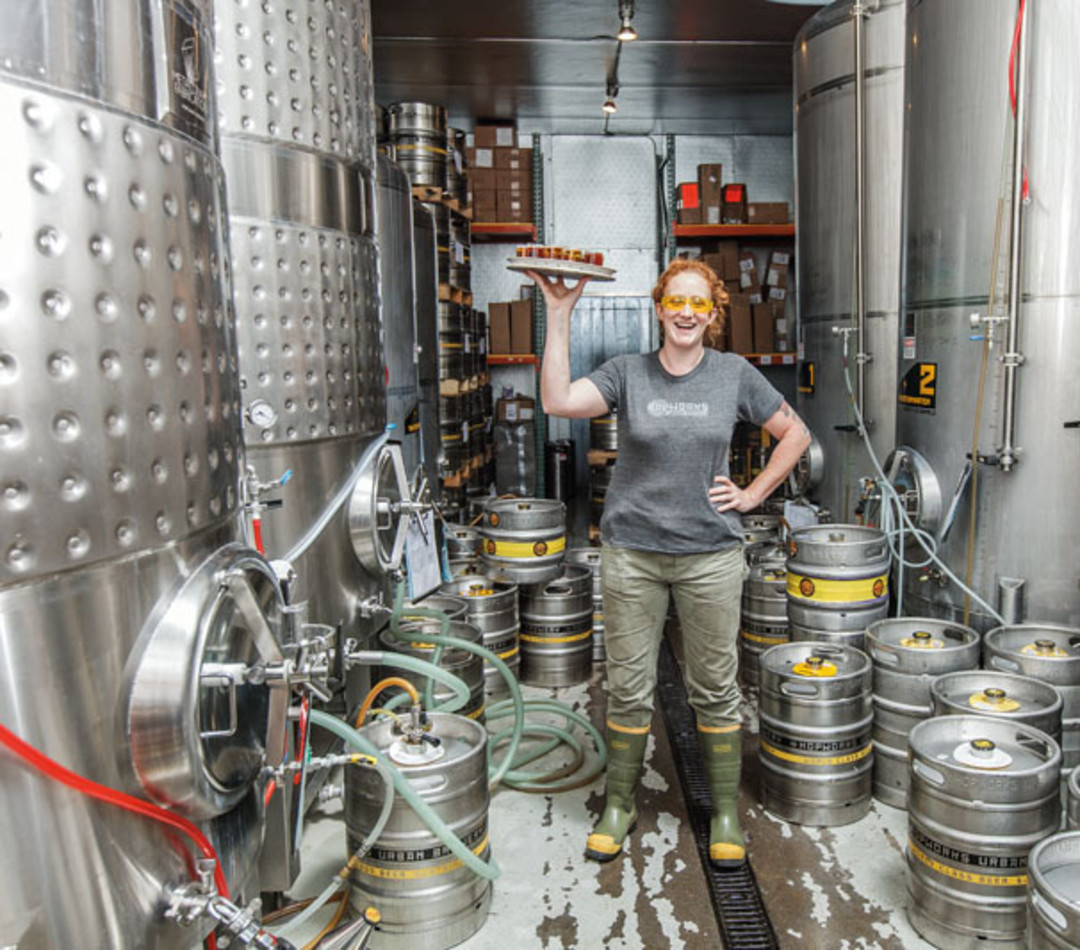
Image: Stuart Mullenberg
DEVELOPMENT (n) Modification, growth, learning, adaptation, progress
Hopworks
- 1 microbrewery, 2 restaurants
- 115 employees
- 11,000 barrels of beer per year
In 2008, Olivia Magnano grad-uated from the University of Washington, a 22-year-old with a communications degree staring into recession’s maw and feeling Portland’s mysterious magnetism. “Why not do a fun service-industry job,” she recalls thinking, “just to meet people and weather the storm?”
She landed as a restaurant host at Hopworks, a new microbrewery and pub with a sustainability bent. She knew little about beer or restaurants. But Hopworks’ HR strategy is as much about learning as brewing, and is as organic as its IPA.
“We take a lot of pride in finding talented, thoughtful people,” owner-brewmaster Christian Ettinger says of the company he’s taken from about 40 to 115 employees. “You can cultivate that, and their roles grow and evolve.”
Magnano quickly became an expediter, making plated food look good as it left the kitchen. Then she moved to server. When the company’s admin department ran short of help, she began filling in half-time. Today, she’s the office manager while in training to lead Hopworks’ human-resources efforts—the company is helping her pay for classes at Portland State.
On her way into her new office job, Magnano passed Amelia Pillow (below), who was headed the other direction. Pillow had started as a server, jumped in as a fill-in bookkeeper, and then become the office manager. But, really, she wanted to make beer. Now 31, she’s worked her way up from keg washer to brewer, with help from an American Brewers Guild certification course the company helped arrange. “I’ve been able to progress very quickly,” she says.
So it goes at Hopworks, where the head salesman used to brew and the newest restaurant manager came up from the kitchen. “There’s no formal policy, but it’s something we do,” Ettinger says. “It’s about communication.”
Related Articles



